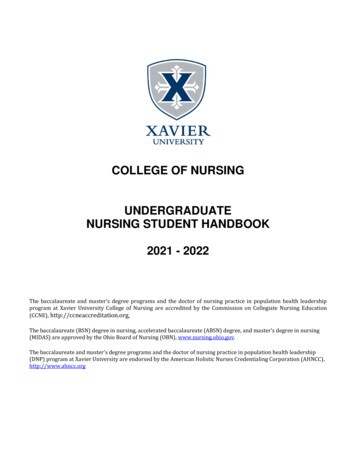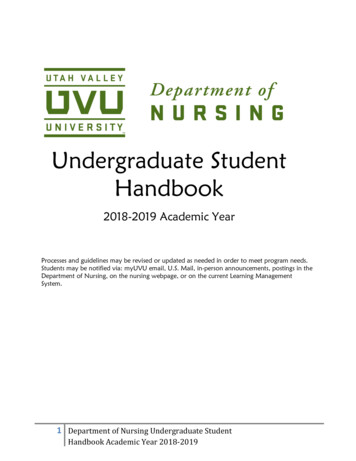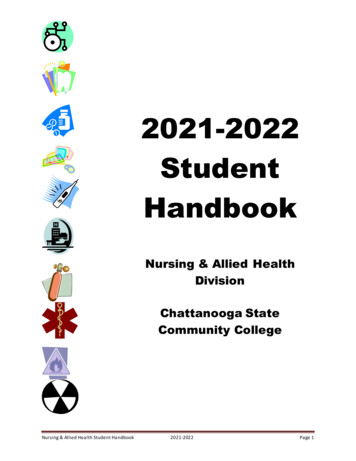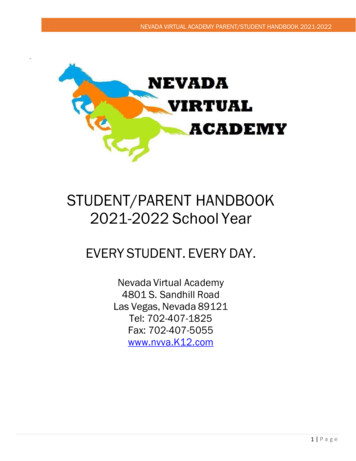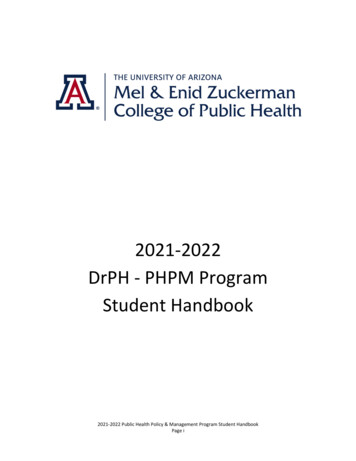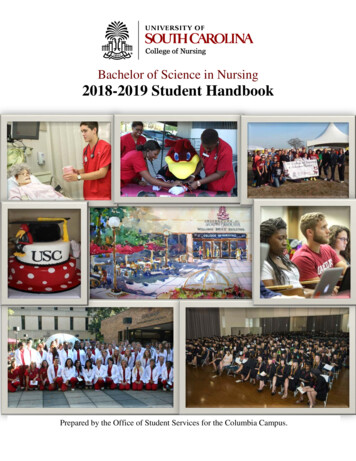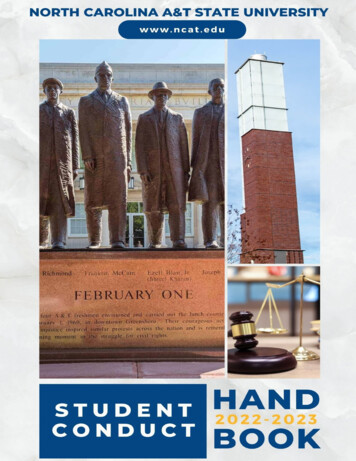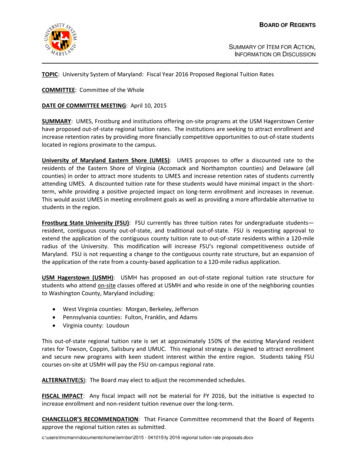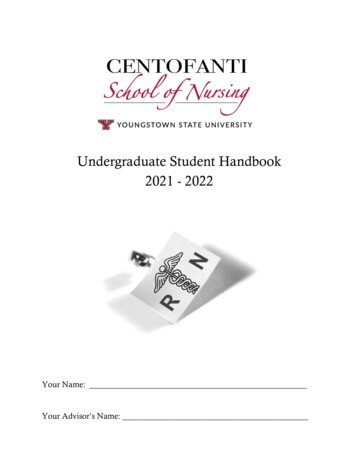
Transcription
Undergraduate Student Handbook2021 - 2022Your Name:Your Advisor’s Name:
TABLE OF CONTENTSIntroduction .History of the Centofanti School of Nursing .Centofanti School of Nursing Mission Statement and Philosophy .Baccalaureate Nursing Program Objectives/Competencies .Organization Chart .Student Academic Policies for the BSN Program .General Academic Policy Statements .Admission Policies .Military Credit .Readmission Policy .Withdrawal Policy . . . .Progression Policies.Grade Requirements .Academic Honesty .Immunization and Fingerprinting Requirements .Clinical Risk .Clinical Requirements .Attendance.Student Conduct .Unacceptable Clinical Behavior .Due Process .Student Grievance Procedure .Uniform/Dress Code/Name Badges .Uniforms .Dress Code .Identification Badges .Incident Report Procedure .Medical Emergency in an Office or Classroom .Transportation for Clinical Learning Experiences .Inclement Weather Policy .Academic Advisement Information .Course Sequencing .Nursing Courses with a Clinical Lab Component.Change of Name, Address, or Phone Number .YSU Email Address and Blackboard .Faculty Advisors.Student Resources .Learning Resource Laboratory .Nursing Skills Lab (Room 2410) .Betty C. Nohra Student Resource Center (Room 2131) .Masternick Nursing Simulation Center (Room 3521) .Support Services.Study Support Groups.Information Sharing .Nursing Faculty Access.Program Evaluation .Survey Questionnaires 18181819191919191920202020212121
Kaplan Testing Program .Graduation Policies .Student Organizations .Student Participation .Student Representatives .Admission Requirements & BSN Curriculum .Social Media Policy .Nursing Student Essential Functions/Abilities for Admission & Progression .CPR and Health Requirements .The Criminal Records Check Law in Ohio . Drug Policy .Code of Ethics for Nurses .Grievance Policy .Uniform Requirements .Approximate YSU Nursing Program Costs .Advanced Standing Policy for Transfer students and LPN’s .Centofanti School of Nursing Faculty Directory .Covid .2122232424Appendix AAppendix BAppendix CAppendix DAppendix EAppendix FAppendix GAppendix HAppendix IAppendix JAppendix KAppendix LAppendix M
INTRODUCTIONThis booklet has been prepared to inform you of privileges and responsibilities inherent in beinga nursing student. It is our hope that this will assist you in obtaining your educational goal of aBachelor of Science in Nursing degree from Youngstown State University.Material included in this student booklet is intended to supplement the information in theYoungstown State University Undergraduate Bulletin regarding Mission and Goals, StudentRequirements and Regulations, Grades and Grading, etc. Students are responsible forinformation in this handbook, the Youngstown State University Undergraduate Bulletin, and TheCode of Student Rights, Responsibilities, and Conduct. All of these are accessible online viaYSU’s website: www.ysu.eduThe Centofanti School of Nursing, as part of the Dominic A. and Helen M. Bitonte College ofHealth and Human Services, has always maintained the highest standards and is proud of itsrecord of preparing well-qualified professional nurses. We are confident that you will join us inmaintaining this record and taking pride in your chosen profession and school.ACCREDITATIONYoungstown State University’s Undergraduate and Graduate nursing programs are accredited bythe Commission on Collegiate Nursing Education, CCNE (655 K Street, NW, Suite 750Washington, DC 20001; (202) 887-6791 and the Accreditation Commission for Education inNursing, ACEN (3343 Peachtree Road NE, Suite 850, Atlanta, GA 30326; 1.404.975.5000;www.acenursing.org) and approved by the State of Ohio Board of Nursing (17 South HighStreet, Suite 400, Columbus, Ohio 43215-7410; 1.614.466.3947; www.nursing.ohio.gov).HISTORY OF THE CENTOFANTI SCHOOL OF NURSINGYoungstown State University’s Centofanti School of Nursing began in 1967, with a two yearAssociate Degree in Nursing (ADN) Program. The Centofanti School of Nursing was part of thenew Technical and Community College (T&CC) within the University, which had recentlychanged from private to a state-supported institution. The first nursing class graduated in 1969and received Associate in Applied Science (AAS) degrees. The program was accredited by theNational League for Nursing (NLN) in 1973. The last Associate Degree class was accepted in1987 and graduated in 1989.In 1971, an RN-Completion Program was initiated and a Bachelor of Science in Applied Science(BSAS) with a major in nursing was awarded. With the initiation of this and other bachelordegree programs, the T&CC became the College of Applied Science and Technology (CAST).The Centofanti School of Nursing began reconstructing the completion program in 1978, andauthorization was received from the Ohio Board of Regents to grant a Bachelor of Science inNursing (BSN) degree in 1979. A grant from the Department of Health and Human Servicesprovided supplemental funds to develop a freestanding BSN completion program. This programgraduated its first class in 1981 and received an eight-year NLN accreditation in 1982.1
Following a thorough study of community nursing needs by the Mahoning Shenango AreaHealth Education Network (now the Eastern Ohio Area Health Education Center), theDepartment developed a four-year BSN Program and submitted an in-depth change of programreport to the NLN in 1984. The first four year entry-level BSN class graduated in 1988. The BSNprogram received an eight-year reaccreditation in 1990. In 1993, CAST became the College ofHealth and Human Services. The National League for Nursing Accrediting Commission(NLNAC), which was the accreditation arm of NLN, reevaluated the program and grantedcontinuing accreditation for another eight years in 1998 and 2006.Work began on development of a Master of Science in Nursing Program in 1988. In 1990, aproposal was submitted to the Ohio Board of Regents (OBOR). The program received favorableOBOR approval in 1996 and accepted its first class in September, 1997. The first MSN classgraduated in the spring of 2000. This Clinical Nurse Specialist (CNS) Program in Chronic Illnessprogram received initial accreditation by the NLNAC in July, 2001. A Nurse AnesthetistProgram, in conjunction with St. Elizabeth Health Center School of Nurse Anesthetist,Incorporated, was added in 2001. The charter class of 12 students was admitted in August, 2001,with 11 students graduating in August, 2003. MSN graduates are eligible to sit for thecertification exam to become a certified Clinical Nurse Specialist (CNS) or Certified RegisteredNurse Anesthetist (CRNA). Graduates from both the CNS and CRNA tracks are required toobtain a Certificate of Authority to practice as an Advanced Practice Nurse in the State of Ohio.In spring of 1998, the Ohio Board of Education approved a School Nurse Licensure programoffered through the Centofanti School of Nursing in conjunction with the College of Education.The curriculum can be taken by nurses as undergraduate or graduate credit. In 2005, a thirdoption, school nursing, was added to the MSN program. Nurse Education and Family NursePractitioner options were added in 2011.MISSION STATEMENTThe Centofanti School of Nursing supports the missions of Youngstown State University and theBitonte College of Health and Human Services. The Centofanti School of Nursing provides highquality baccalaureate and graduate nursing programs that are responsive to the health care needsof society. The Centofanti School of Nursing values high standards of professional ethics;cultural, racial, and ethnic diversity; and student-faculty relations that foster excellence inteaching, learning, scholarship, and public service.The program offers both a four year entry-level track for new or transfer students who do nothave a diploma or degree in nursing or a RN-BSN completion track for Registered Nurses with adiploma or associate degree. The curriculum is designed to include a broad base in generaleducation and a strong nursing foundation. Graduates are prepared to function as generalists withprofessional and technological competence in a variety of settings.PHILOSOPHYThe following is the Department’s beliefs about humanity, environment, health, professionalnursing practice and learning. The human being is an interwoven unity influenced by cultural,biological, psychosocial and spiritual elements. Human functioning is a unique integration ofthese elements. Humans possess motivation, creativity, intellect and individual perceptions when2
functioning and interacting with the world around them. The individual should be considered anintegrated whole that is unique and deserves respect.The human being and environment form an integrated system. The environment that influenceshuman function consists of internal and external components that affect individuals, families,groups and communities. The environment includes economic, political, social, spiritual andphysical surroundings. Human beings can creatively change components of the environment thatmay increase their ability to achieve a desired level of human functioning.The individual and society share the responsibility for one’s health. Health is a state ofwholeness or integrity of individuals. Health is a result of diverse cultural, biological,psychosocial, spiritual and environmental elements that exist on a continuum across the life span.Health demands are met by assisting individuals to participate in activities necessary to meetoptimal health outcomes.Nursing is a caring profession that exists to meet society’s healthcare needs by assistingindividuals, families, groups, and communities to identify and achieve their health goalsthroughout the life cycle. Nursing is an art that creatively uses knowledge from the sciences andhumanities to plan and provide therapeutic interventions to meet the unique healthcare needs ofsociety. Nursing is an evolving science that synthesizes concepts and theories through researchand critical inquiry to develop an understanding of human responses to health needs. Nursingprocess is the basis of professional practice. Nursing assumes leadership roles in healthcare,legislation and public service to identify and implement changes in the delivery of healthcare.Learning in the undergraduate and graduate nursing education programs is a continuous processinvolving cognitive, affective and psychomotor skills. Personal growth and self-discovery in thelearning process are enhanced in an environment that encourages collegial relationships thatstimulate a curious examination of the world. The results of the educational experience are thedevelopment of communication processes, critical thinking, analytic inquiry, creativity andprofessional judgment that prepares the student for future challenges in nursing practice.Faculty serves as motivators and facilitators of learning. Faculty seeks to inspire an appreciationand desire in each student for new knowledge and life-long learning. Graduates of undergraduateand graduate programs will be an integral part of the continued development of the profession.The graduates will participate in endeavors to discover new knowledge and methods to meet thehealth needs of all individuals.3
Baccalaureate Nursing Student Learning OutcomesThe integration of nursing theory, clinical practice, and critical thinking serves as thefoundation for the program and upon completion of the program, the graduate is able to:1. Utilize the American Nurses Association Standards of Care whenproviding care for individuals, families, groups, and communities acrossthe life span.2. Utilize critical thinking in decision-making and problem-solving whileadhering to the Professional Code of Ethics for Nurses.3. Utilize effective and appropriate interpersonal communications andinformation technology.4. Apply theories and research findings from nursing and other disciplines toprovide evidence-based, clinically, competent care.5. Provide culturally sensitive care and health education to individuals,families, groups, and communities.6. Demonstrate leadership and apply management skills that promoteaccountability, legal and ethical conduct, and maintenance of standardsof care.7. Collaborate with the interdisciplinary healthcare team in planning,coordinating, and evaluating outcomes for quality cost-effective care andcontinuous improvement of the healthcare system.8. Manage human and material resources to provide access to healthcarefor individuals, families, groups, and communities.9. Advocate for public policy to provide and protect the health of the public.10. Demonstrate commitment to life-long learning and service to the nursingprofession.Baccalaureate Nursing Program Competencies.Revised.20104
5
STUDENT ACADEMIC POLICIESFOR THE BACHELOR OF SCIENCE IN NURSING PROGRAMI. General Academic Policy StatementsA. The general faculty organization of the Centofanti School of Nursing delegates to theAdmission, Progression, and Graduation (AP&G) Committee the responsibility ofimplementing policies and procedures regarding admission, readmission, progression, andgraduation. Following a review of grades each term, the AP&G Committee and the School ofNursing’s Director act on student progression, readmission, and graduation matters accordingto established policies.B. The AP&G Committee reserves the right to make recommendations concerning preferencefor readmission, progression, and graduation in order to preserve the high standards essentialfor approval by accrediting bodies.C. The Centofanti School of Nursing reserves the right to implement changes in curriculum,schedules, and policies in order to preserve high standards essential for approval byaccrediting bodies.D. The Centofanti School of Nursing will inform students about policy and curriculum changesvia their YSU email (student.ysu.edu) and class announcements.E. The Centofanti School of Nursing reserves the right to dismiss a student for legal, ethical,academic, emotional, and/or physical reasons.F. A decision to be absent from regularly scheduled theory and clinical classes, for whateverreason, including employment, does not excuse the student from the responsibility ofexaminations, assignments, or the knowledge acquired by attending class. Makeup of theclass work, assignments, or examination(s) is the responsibility of the student, and will bedetermined by the faculty member.G. Each student is individually responsible for adhering to the requirements of the nursingcurriculum at the time of admission/readmission. (See Appendix A: Admission Policy &BSN Curriculum)H. Students who have questions or concerns must adhere to the following steps: Students with general academic concerns must first consult with their faculty advisor. Students with concerns about a nursing theory course must first consult with the theorycourse faculty member. Students with concerns regarding nursing clinical courses must first consult with theirclinical faculty member.If questions or concerns are not resolved at the student-faculty level, the student or facultymember may request a joint meeting with the Director of the School of Nursing.I. The nursing student must practice within the boundaries of: 1) the Nurse Practice Act for theState of Ohio; 2) the Youngstown State University Centofanti School of Nursing Policies; 3)the clinical course objectives and guidelines; 4) the Code of Student Rights, Responsibilities,and Conduct of Youngstown State University; and 5) the policies and procedures of the healthcare agencies and community organizations.J. Students are expected to abide by the following guidelines, “How to Avoid DisclosingConfidential Patient Information”, developed for nurses by the National Council of State Boardsof Nursing. (See Appendix B: Social Media Policy).6
ADMISSION, READMISSION, AND WITHDRAWAL POLICIESII. Admission PolicyA. Upon admission to the Nursing Program, a student must provide the followingdocumentation. All requirements are due by September 1st. Current CPR certification, American Heart Associate certification for HealthcareProviderCompleted history and physical examo A history & physical (H&P) exam form, dated no earlier than six months prior toadmission, must be completed by a Healthcare Provider.o Note: A copy of the required H&P form is available on Castlebranch website. Theform will also be given out at Sophomore Orientation meeting.Nursing Student Essential Functions/Abilities for Admission and Progressiono Certain functional abilities are essential for the nursing student to deliver safe,effective nursing care. These abilities are essential because they constitute corecomponents of nursing practice, and there is a high probability that negativeconsequences will result for patient/clients under the care of nurses who fail todemonstrate these abilities. (See Appendix C: Nursing Student EssentialFunctions)Immunizationo All students accepted into the nursing program are required to providedocumentation via Castlebranch. (See Appendix D: CPR and HealthRequirements)o The two-step tuberculin (Mantoux) skin test is required initially on admission. Aone-step tuberculin (Mantoux) skin test is required annually thereafter. If the testis positive, a negative chest X-ray result is required annually. If a student hasreceived BCG immunization, a chest x-ray, T-spot, or Quantiferon Gold test isrequired in lieu of the tuberculin test.o A positive hepatitis titer is required. If the hepatitis titer is negative, the hepatitisbooster vaccine is required. It is a three-part series given at 0, 1 and 6 months.Another hepatitis titer will be drawn 4-6 weeks later. At least two of the threehepatitis boosters must be completed prior to sophomore clinicals in Springsemester.o A positive titer is required one time for MMR, Varicella and Hepatitis B.o TDap vaccine is required one time and must remain current.o Note: It is recommended that the above requirements be uploaded as received.Drug Screeningo Drug screen forms are available on the Castlebranch website. (See Appendix E:Drug Screen Policy)Fingerprintingo Fingerprinting for Ohio Bureau of Criminal Identification and Investigation (BCI)and Federal Bureau of Investigation (FBI) check must be completed throughCastlebranch. (See Appendix F: The Criminal Records Check Law in Ohio)o Fingerprinting will take place in the Nursing office at the beginning of Fallsemester. All students must sign up online prior to scheduled dates. Details willbe presented at the mandatory student orientation.7
o Note: Certain egregious felonies are absolute bars to taking the licensure exam.Some lesser offenses may impede student placement at a clinical site which willaffect student’s ability to progress in the program.Handbook agreemento The Undergraduate Student Handbook provides academic policies and relevantinformation that each student is responsible to follow throughout the program.Any changes that become necessary will be communicated in writing. The studentis required to sign off via Castlebranch website stating that they read and complywith these policies.B. Malpractice insurance is required for all clinical nursing experiences and is provided by theUniversity.C. Student Health Insurance is an individual student responsibility.III. Military CreditYSU has been designated “Military Friendly, by GI Jobs Magazine and “Best for Vets” by theMilitary Times Group. At YSU, all courses from the Community College of the Air Force or theJoint Service Transcript (Army, Marines, Navy, and Coast Guard) are reviewed and applied tothe YSU transcript if equates exist. Each military service member/veteran will receive at aminimum six credit hours towards their General Education Requirement. Based on military jobskill, the student veteran may receive more. Military Training may transfer as general credit,elective credit, or may apply to your degree.Typically, the majority of credit is applied as elective hours unless the topic listed on the militarytranscript is equivalent to a nursing course offered at the University. Transcripts will be reviewedby the Department of Undergraduate Admissions and the Nursing AP&G committee. Ifrequested by the Department of Veteran’s Affairs, the Director of the School of Nursing may beasked for final review.The Carl A. Nunziato Student Veterans Resource Center is located at 633 Wick Avenue. Theymay be reached by phone at (330) 941-2503.IV. Readmission PolicyA. Readmission Procedure as follows:1. The student may need to reapply with the University Admission Office (See UniversityUndergraduate Bulletin).2. The student must submit a written request for readmission to the Admission, Progressionand Graduation (AP&G) Committee. This letter must be received by the AP&GCommittee no later than March 1st for Fall Semester readmission or October 1st forSpring Semester readmission.3. Students will be notified about their readmission status prior to the last day to add a classon the academic calendar.4. Students who have not completed a clinical nursing course for 2 or more consecutivesemesters (including summer semester) are required to successfully complete a review ofmodule and exam for readmission. Students must demonstrate competency necessary tomaximize safety and minimize risks for students, patients, and others in clinical courses.Students must successfully complete a module review and pass the module exam withand 80% or better.8
B. Unsuccessful completion of the review of module and examination with an 80% or betterwill result in the student being denied readmission into the nursing program.C. Readmission into the nursing program is not guaranteed and will be granted as clinical spacesare available. Previous YSU students will take precedence over transfer students.D. Upon satisfactory completion of the review of modules, preference for readmission is asfollows:1. First Preference: Students who withdrew for personal or health reasons.2. Second Preference: Students who repeated a course because of unsuccessful completionof a required course.E. The AP&G Committee notifies the student in writing about their readmission status.F. Readmitted students must meet the curriculum requirements effective at the time ofreadmission.G. The student will not be permitted to re-take a clinical instructor that they previously had in afailed course or clinical.V. Withdrawal Policya. Students withdrawing from the nursing program or any required course in the nursingcurriculum must:i. Inform the course faculty member (if withdrawing from an individual course)ii. Inform their individual nursing faculty advisor. Faculty advisors are available for aconference during regular office hours or by appointment.iii. Notify the Admission, Progression and Graduation (AP&G) Committee in writing. Thisletter will be placed in the student’s academic file. Failure to notify the committeewill result in last preference for readmission.b. When a student withdraws, readmission into the nursing program is not guaranteed and willbe granted only as availability of clinical space allows.c. In addition, withdrawals are to be executed in accordance with University Policy (See Policyfor Withdrawal and Refunds section in the current YSU Undergraduate Bulletin.)PROGRESSION POLICIESI. Grade RequirementsA. Students are responsible for adhering to the prescribed Bachelor of Science in Nursing (BSN)curriculum sequence, including but not limited to, course prerequisites and mandatedsequencing of nursing classes. A failing grade in prerequisite courses must be removedprior to taking sequential courses in nursing. Students must follow the BSN Curriculum inthe Undergraduate Student Handbook effective for the year of the student’sadmission/readmission to the nursing program (See Appendix A: Curriculum Sheet).B. Students who register for conflicting nursing courses will not be permitted to remain enrolledin those conflicting courses. A student will be administratively removed from the conflictingcourse.C. All pre-nursing, nursing, and nursing support courses (BIOL1560/L, FNUT 1551) must betaken for a letter grade. Electives, including general education elective hours, may be taken9
CR/NC. Only one course per term with a maximum of 12 semester hours in a baccalaureatedegree program can be taken CR/NC. Refer to the YSU Undergraduate Bulletin CR/NCPolicy and consult your nursing advisor before taking a course CR/NC.D. Once admitted into the nursing program, students must maintain an overall cumulative GPAof 2.00 or above.E. The grading scale for the Centofanti School of Nursing is:A 93-100B 86-92C 78-85*D: 70-77*F: Below 70* requires repetition in the nursing curriculumF. A grade of “C” or better is required in all nursing courses and non-nursing support courses(BIOL 1560/L, FNUT 1551).G. Students who receive an incomplete (“I”) grade in a nursing or non-nursing support course(BIOL 1560/L, FNUT 1551) must remove the "I" with a grade of “C” or better prior to thebeginning of the course for which it is a prerequisite. All “I” prerequisite course grades ofincomplete must be removed for admission to the program.H. Whe
Bachelor of Science in Nursing degree from Youngstown State University. Material included in this student booklet is intended to supplement the information in the Youngstown State University Undergraduate Bulletin regarding Mission and Goals, Student Requirements and Regulations, Grades and Grading, etc. Students are responsible for
